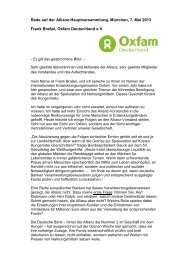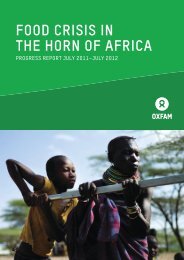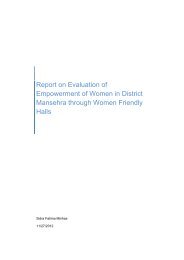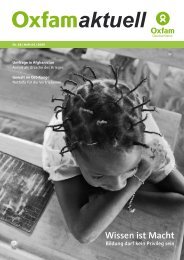shape - Oxfam
shape - Oxfam
shape - Oxfam
Create successful ePaper yourself
Turn your PDF publications into a flip-book with our unique Google optimized e-Paper software.
CHALLENGES THAT REMAIN<br />
As SHAPE’S Gender, Masculinities and HIV project<br />
continues to grow, it faces several key challenges –<br />
namely, extending its circle of influence, evaluating<br />
the effectiveness of its work and addressing the<br />
complexities and realities of daily life in Zimbabwe.<br />
1. Involving the wider university<br />
community including academic<br />
and non-academic staff.<br />
SHAPE realises that it needs<br />
to engage the wider university<br />
community, especially academic<br />
and non-academic staff, more<br />
actively in its activities. This is<br />
recognised as a key step towards<br />
transforming the university’s<br />
institutional culture to be more<br />
responsive to gender equality<br />
issues. SHAPE has started<br />
targeting university administrators<br />
in its activities after realising that<br />
several sexual harassment<br />
complaints raised by female<br />
students involved male university<br />
staff members. SHAPE has<br />
introduced friendly weekend<br />
soccer matches for university staff<br />
during which issues such as toxic<br />
masculinities and gender are<br />
discussed in a friendly, informal<br />
environment. This approach helps<br />
to raise awareness about these<br />
issues in a non-confrontational,<br />
non-accusatory way. This project<br />
is still in its infancy and yet to be<br />
fully developed.<br />
2. Involving student leaders<br />
and Christian student groups.<br />
SHAPE has also had limited<br />
success in attracting particular<br />
groups of students, especially<br />
those from the Christian<br />
community and those in the<br />
Student Executive Council.<br />
The latter offer a rich opportunity<br />
to utilise student-recognised<br />
leadership, while Christians<br />
comprise the largest and most<br />
organised community on the<br />
various campuses. Religion<br />
is often used to justify gender<br />
inequalities, and the churches<br />
on campus are still relatively<br />
silent on issues surrounding<br />
HIV and AIDS.<br />
3. Defining “non-toxic”<br />
masculinities.<br />
SHAPE has a clear understanding<br />
about what behaviours constitute<br />
toxic masculinities and this has<br />
been a vital first step in its project.<br />
However, it is grappling to define<br />
what “non-toxic” masculinities<br />
look like in practice, which is<br />
important to the development<br />
of an alternative masculine<br />
identity. Without this, male<br />
students are only confronted<br />
with the behaviours they<br />
shouldn’t display, rather than<br />
understanding what behaviours<br />
are actually appropriate.<br />
4. Evaluation and documentation<br />
to enable project expansion.<br />
The SHAPE Gender, Masculinities<br />
and HIV project has not been<br />
evaluated since its inception<br />
and this makes it difficult to<br />
identify whether student attitudes<br />
and behaviours have actually<br />
changed and in what ways. The<br />
experiences of female and male<br />
students who have been, or are<br />
involved in, the project have not<br />
been systematically documented.<br />
Collecting this information will<br />
enable SHAPE to improve and<br />
expand project components<br />
beyond the present scope.<br />
5. Ensuring students<br />
continue behaviour<br />
change beyond university.<br />
Sustaining students’ behaviour<br />
change beyond the confines of<br />
university is one of SHAPE’s<br />
greatest challenges. The project<br />
lacks continuity for students when<br />
they go on vacation, are on their<br />
year-long work-related placements<br />
or when they graduate. This means<br />
that students who have completed<br />
the masculinities or assertiveness<br />
training experience a major<br />
disruption to the behaviour change<br />
process during these periods.<br />
To compound matters, they are<br />
often confronted with stereotypical<br />
gender roles and face resistance<br />
from family, peers or work<br />
colleagues to their new behaviours.<br />
BOTTOM: MSU students Priviledge, Belinda<br />
and Gloria catch up over a coffee in the female<br />
hall of residence on campus. Photo: William<br />
Nyamuchengwa/<strong>Oxfam</strong>AUS.<br />
It is particularly important for<br />
SHAPE to find ways of continuing<br />
to engage with students who are<br />
away from campus during their<br />
third year, on work-related<br />
learning. At MSU, all students<br />
are expected to spend one year<br />
in the field, working with relevant<br />
organisations in order to gain<br />
work experience related to their<br />
degree courses. SHAPE currently<br />
has no way of knowing if, and<br />
how, these students are sustaining<br />
their new behaviours and attitudes<br />
beyond the university environment<br />
and beyond the SHAPE influence.<br />
SHAPE is currently setting up an<br />
alumni program that will enable it<br />
to keep in touch with former<br />
students and use them<br />
as resources in future activities.<br />
6. Addressing the effects of<br />
Zimbabwe’s economic crisis on<br />
students.<br />
Zimbabwe’s worsening economy<br />
and increasing poverty levels<br />
present huge challenges to<br />
SHAPE’s HIV prevention work.<br />
Spiralling inflation rates, daily<br />
increases in commodity prices<br />
and soaring unemployment mean<br />
that basic necessities such as<br />
food and clothing are beyond<br />
the reach of most people.<br />
These diminishing resources can<br />
undermine HIV prevention work<br />
at MSU as students are forced to<br />
make choices which place them<br />
at great risk of contracting HIV –<br />
for example, female students<br />
trading sexual favours for food and<br />
clothing. In these circumstances,<br />
students place immediate survival<br />
above their long-term health.<br />
YOU NOTICE THAT WE (WOMEN) ARE<br />
ECONOMICALLY MARGINALISED. WHEN<br />
WE COME TO SCHOOL, BECAUSE WE<br />
ARE FEMALES, WE THINK WE CAN MAKE<br />
MONEY FASTER AND BECAUSE MEN SEEM<br />
TO OFFER US THOSE THINGS THAT WE<br />
DON’T HAVE AND ALSO BECAUSE OF<br />
THE WAY WE HAVE BEEN BROUGHT UP,<br />
WE OFFER OURSELVES AS A CHEAP<br />
EXCHANGE FOR MONEY, EXPENSIVE<br />
THINGS AND THIS PASSION FOR FOOD<br />
AND BEAUTIFUL THINGS, WE END UP<br />
EXCHANGING OUR VALUES, OUR MORAL<br />
VALUES FOR LITTLE GIFTS AND THINGS<br />
LIKE THAT. GRACE R CHIRANGE, FOURTH-YEAR STUDENT.<br />
26 27


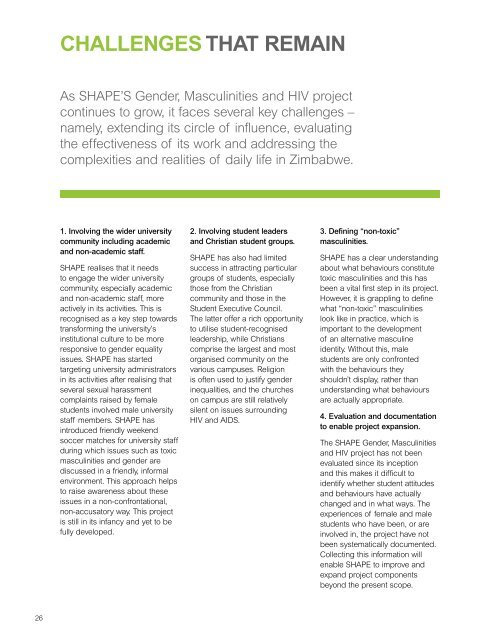

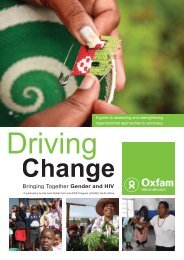

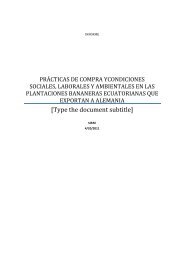
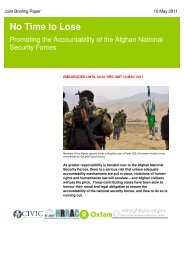
![Download: Faltposter EU-Handelspolitik [PDF 2,17MB] - Germanwatch](https://img.yumpu.com/25095854/1/190x161/download-faltposter-eu-handelspolitik-pdf-217mb-germanwatch.jpg?quality=85)
